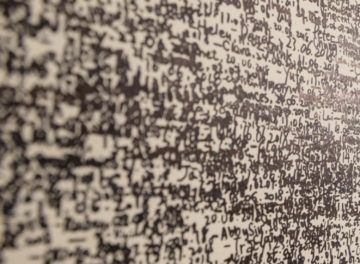Richard Hughes Gibson in The Hedgehog Review:
 In his 1987 book Die Schrift, the Czech-born Brazilian philosopher Vilém Flusser posed the question of whether writing had a future (Hat Schreiben Zukunft? reads Flusser’s subtitle). As he surveyed the media landscape of the late twentieth century, Flusser observed that some aspects of writing (“this ordering of written signs into rows”) could already be “mechanized and automated” thanks to word processing, and he foresaw that artificial intelligence would “surely become more intelligent in the future” allowing the mechanization of writing to proceed further.
In his 1987 book Die Schrift, the Czech-born Brazilian philosopher Vilém Flusser posed the question of whether writing had a future (Hat Schreiben Zukunft? reads Flusser’s subtitle). As he surveyed the media landscape of the late twentieth century, Flusser observed that some aspects of writing (“this ordering of written signs into rows”) could already be “mechanized and automated” thanks to word processing, and he foresaw that artificial intelligence would “surely become more intelligent in the future” allowing the mechanization of writing to proceed further.
In fact, Flusser anticipated that AI would soon exhibit the hallmark cognitive traits of the mental world inaugurated by writing. Of that mental world, Flusser writes, “Only one who writes lines can think logically, calculate, criticize, pursue knowledge, philosophize.” Above all, Flusser credits writing with giving humans “historical consciousness,” which he defines as the ability to see and describe the world in terms of goal-oriented processes—as opposed to the unchanging cycles that marked prehistorical societies. AIs, in Flusser’s view, will soon “possess a historical consciousness far superior to ours,” allowing them to “make better, faster, and more varied history than we ever did,” with the result that we’ll leave the business of history-writing to them. Writing may indeed have a future, Flusser believed, but that future won’t be an entirely, or even primarily, human one.
More here.
